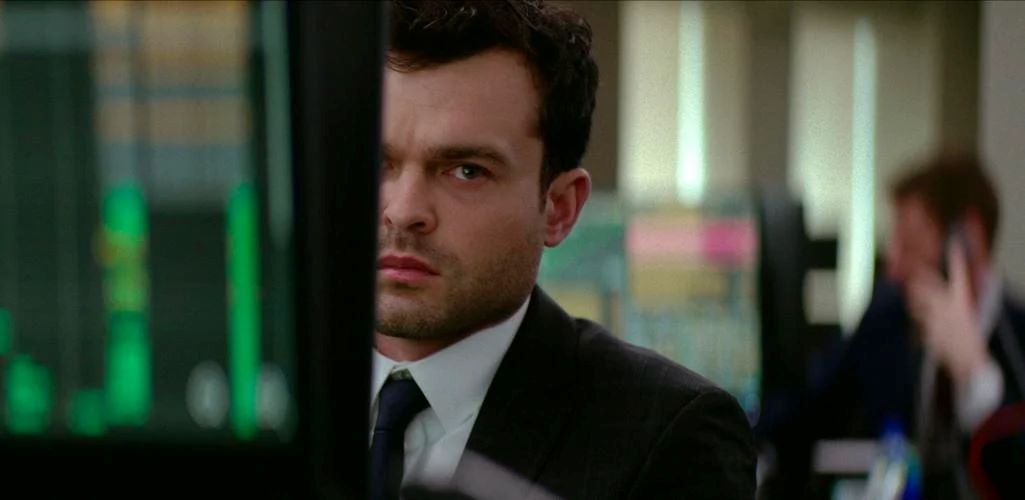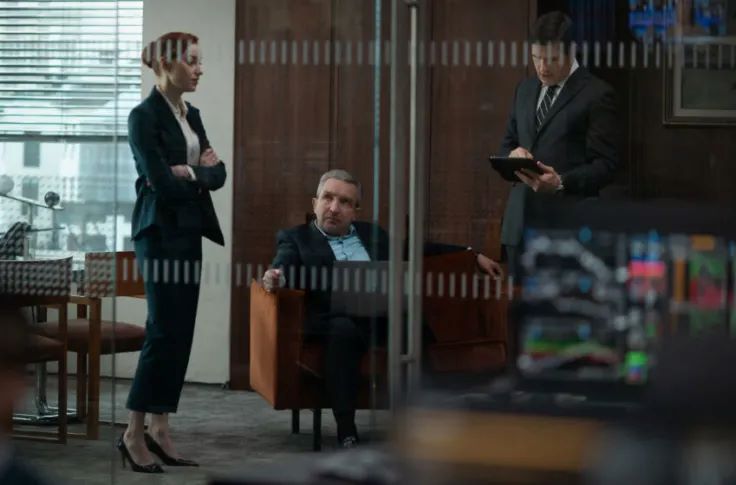By Alex McPherson
Powered by enthralling performances from Phoebe Dynevor and Alden Ehrenreich, director Chloe Domont’s “Fair Play” is an effective, if exhausting, thriller exploring gender politics and self-destructive ambition in a corporate world devoid of empathy.
The film follows Emily (Dynevor) and Luke (Ehrenreich), who we first meet on the dance floor of a New York City wedding reception. They sneak away to the bathroom to have sex, and in the middle of it, Luke’s engagement ring falls out of his pocket. Turns out, he was planning on proposing to Emily. She enthusiastically says yes. Luke and Emily are happy, and everything seems nice and dandy — so long as, we soon learn, their shared workplace doesn’t learn about their romance, and Emily’s chatterbox mother doesn’t spill the beans to anyone else.
Emily and Luke are both stock analysts at the same company, One Crest Capital, where inter-office romance goes against company policy, and sanity goes to die. Analysts work long hours in hopes of ascending the ranks of power, hungering at any opportunity for a promotion by the hand of coldly intimidating Campbell (Eddie Marsan).
Suited-up workers (mostly men) live and breathe financial jargon; each decision to buy or sell is based on insider information they’ve plugged into with obsessive attention to detail, with plenty of toxicity to spare in their predatory glances and fake-nice banter. They’re opportunistic, skilled at their jobs, and always on the lookout for blood in the water like well-dressed sharks.
After OCC’s “PM” (portfolio manager) is unceremoniously fired — the frustrated sap smashes up his office with a golf club — rumors spread that Campbell is eyeing Luke to take over the role. Luke is thrilled, as is Emily; this is Luke’s big break, an acknowledgement of his hard work and dominance over his peers. Things don’t play out like Luke anticipates, though. Emily gets a late-night call inviting her for drinks with Campbell, who informs her that she’s going to be the new PM.
Let’s just say, Luke is none too thrilled, despite his performative attempts at congratulating Emily. And thus begins the couple’s downward spiral, as deep-seated insecurities and OCC’s cancerous work culture seeps into their very beings — tearing them apart from the inside out. And we get to see it all for our entertainment.
Indeed, “Fair Play” is a striking, viscerally uncomfortable viewing experience unfolding like a train wreck we’re powerless to stop. With crackling dialogue, committed performances, and nerve-shredding editing, the film is an impressive feature debut from Domont, albeit one whose pedal-to-the-metal approach becomes numbing after a certain point. It’s a feel-bad, socially-aware thriller spiked with cynicism and fatalism.

Gluing all this together are two attention-grabbing performances from Dynevor and Ehrenreich making the whole ordeal even more (intentionally) painful to witness. They’re both beautiful people, given plenty of time to enjoy each other’s bodies and exchange playful banter, but the shadow Emily’s promotion casts over their connection is keenly felt from the moment it’s revealed. Emily and Luke’s subsequent conversations take on a different tone entirely, from passive-aggressive to viciously confrontational.
Dynevor adeptly sells Emily’s hard-working mindset and gradual realization of her crumbling relationship — her efforts to cling to what’s left of her bond with Luke (mostly sex) are stifled by Luke’s unwillingness to reciprocate: it’s the one thing he has power over that he can spitefully refuse her. As Emily weaves between her personas to fit in with the “boy’s club,” her ability to maintain composure slips further and further, erupting in righteous fury in the harrowing third act, as her desperate attempts to hold onto the impossible backfire.
Through subtle (and not so subtle) body language and dialogue, Dynevor imbues Emily with humanity lacking from the majority of male characters. “Fair Play” doesn’t necessarily endorse Emily’s drastic decisions later on, but she’s depicted as the far more three-dimensional, sympathetic character than Luke ever is. This isn’t necessarily an issue, but Domont’s attempts to be provocative fall somewhat short when Emily’s side of the conflict is so easy to latch onto compared to Luke’s, whose ingrained issues are apparent early on and irreversible.
Luke, by contrast, is a deeply insecure, jealous man schooled on problematic forms of masculinity where any threat to his ego and status hits like a sledgehammer: a sleight against his work-obsessed being that he’s worked hard to cultivate. Ehrenreich is excellent, as always, perpetually looking like a sad puppy behind Emily’s back — rendering Luke’s steep de-evolution into rageful hate all the more believable and chilling, albeit telegraphed early on. The further Emily climbs, the further Luke sinks into bitterness: both sides are unable to extricate their personal lives from their work lives, resulting in alarming sequences brought vividly to life by the actors, who deliver Domont’s acerbic screenplay with fanged precision.
Stylistically, “Fair Play” operates at a high level, too, enhancing the ferocity of the performances. Menno Mans’ cinematography is oppressively constrained, closing in on Emily and Luke as violent tension escalates. While not filmed in New York City, Mans’ camera, combined with jarring sound design (heightening sounds of a screeching metro or speeding cars to cold, uncaring, machinelike effect) beautifully conveys the treacherous world Luke and Emily have brought themselves into. Ominous skyscrapers loom overhead observing their every move. It’s almost like we’re watching a horror film.
By the third act, when things really go off the rails, “Fair Play” can be tough to stomach, and hopelessly pessimistic in its depiction of two characters losing their grasp on reality. But that’s exactly how we’re supposed to feel: stressed and panicked, with no room to breathe until the credits roll and we’re finally removed from this unpleasant conflict. The hysterics can be tiring, yet “Fair Play” is still compulsively watchable from start to finish, with ever-relevant themes that linger.

“Fair Play” is a 2023 drama-thriller written and directed by Chloe Domont starring Phoebe Dynevor, Alden Ehrenreich, and Eddie Marsan
It is rated R for pervasive language, sexual content, some nudity, and sexual violence, and the run time is 1 hour, 53 minutes.
It opened in select theaters Sept. 29 and began streaming on Netflix Oct. 6. Alex’s Grade: B+.
Alex McPherson is an unabashed pop culture nerd and a member of the St. Louis Film Critics Association.

